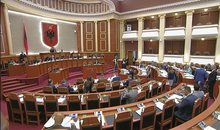
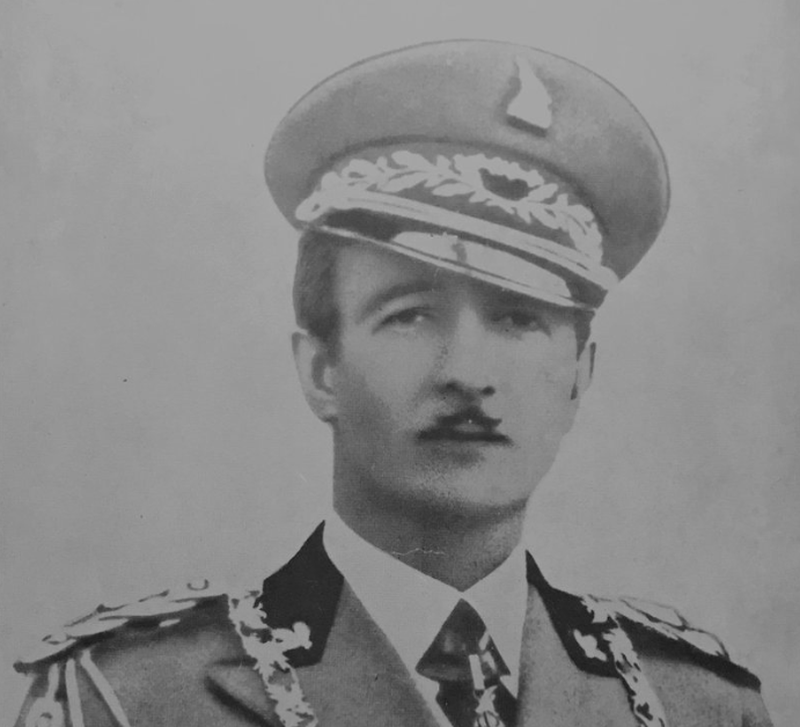
Ekrem Spahiu
History provides all the historical, political, legal, and military evidence that the Albanian Kingdom promoted resistance and the Anti-Fascist War.
Communist historiography, despite inalienable evidence and impartial reasoning, fabricated alibi for Zog's relationship with Italy, as if he sold Albania as if he welcomed the fascist invasion with open arms, and as if he abandoned the country.
But historical truth is not determined ideologically.
It is a fact that Zogu addressed the largest volume of economic and military relations with Italy. But we ask: What time and which Albanian citizen has not considered Italy the greatest strategic partner? Even the Albanian communist state considered that "Our relations with Italy are normal, they have improved continuously, and there are all possibilities for their further improvement."
It is important to point out that at the moment when King Zog found that Italy had far-reaching goals of conquering Albania, he did not accept the Italian fascist invitations, requests, ultimatums, or pressures to bind Albania eternally to the so-called "treaties of common defenses," which were political instruments of military pre-occupation, a "suffocating embrace of Italy," as one researcher would describe it. Italy probably prejudged King Zog as a statesman who could "give in to an Italian pressure against his will, or his interests". Within this bias, the Italian side had thought that the financial threat could be used as pressure to accept the renewal of the Treaty and that "the policy of tightening the screws, cutting off aid, i.e., the suspension of the payment of the loan installment... would be Archimedes' lever that would break the king". But these pressures, as proven in many documents, "failed to shake him from his irrevocable position."
It is already proven by authentic documents that "From the middle of February 1939, the Italian-Shipitaro relations took a further turn for the worse when the king of the Albanians started playing with open cards" and that King Zog's efforts to denounce Italian subversive activity, the Italian side sought to suffocate them through its efforts even "to eliminate King Zog", as the main obstacle to the invasion plans.
If King Zog had "sold" Albania, as communist historiography suggests, then Italy would have come to Albania with tourist yachts. On the contrary, it is already universally known that Italy invaded Albania with a well-studied military plan through a real military operation, where the forces of large operational units of over 25,000 soldiers, hundreds of warplanes, dozens of warships, etc., were engaged.
Meanwhile, the dignified resistance of the Albanian army and gendarmerie, led by Major Abaz Kupit, one of Zog's loyal soldiers, is also officially recognized.
Communist historiography, even the later one, has anathematized the departure of King Zog from Albania as if it constituted "abandonment of the anti-fascist war". But with sound, not blind reasoning, we find Haakon VII of Norway refused to bow to German pressure in World War II to abdicate, inspired army resistance, went into exile in England, and returned from exile to Norway in June 1945, thus enjoying the respect of the Norwegian people. Queen Wilhelmina of the Netherlands was subjected to almost the same fate. Despite this, King Leopold III of Belgium stayed put but, forced by German military supremacy, was forced to surrender, which cost him a long political and humiliating ordeal until the loss of the throne.
King George II of Greece, Grand Duchess Charlotte of Luxembourg, King Peter II of Yugoslavia, President Edvard Beneš of Czechoslovakia, and President Vladysłav Raczkievicz of Poland went into exile during the Nazi occupation of their countries.
No one declared these heads of state "traitors" of their countries. They simply did not accept the invasion and, therefore, they would not accept the humiliation that they would suffer from a power tens of times larger and more ferocious than Nazi Germany.
Then, even the sound reasoning of Albanian historiography should write in large letters that Zog's departure from Albania was an expression of the rejection of the invasion, sparing the prestige of Albania and itself the humiliation from the fascist or Nazi invaders.
If we were to accept the communist thesis that Zogu "sold" Albania, we would also have to accept the thesis that he would naturally go to settle in some villa in Italy, where he would be greeted with flowers. But, as is well known, Zogu never set foot in Italy his entire life. Despite this, he chose to stay and work for the anti-fascist war precisely in Britain. This country led the war against fascism and Nazism to exercise its anti-fascist and anti-Nazi commitment through active diplomacy in London and the activation of Zogist forces inside Albania in support and support of the Great Anti-Fascist Alliance.
Meanwhile, his loyal forces in this war, led by Abaz Kupi, continued the anti-fascist resistance, precisely in the period when no other political force had started this war. Abaz Kupi preserved exactly the anti-fascist legacy and loyalty of the King, continuing the anti-fascist resistance even further, accepting, at the same time, to cooperate with the other anti-fascist military forces of the country, being accepted for this attitude and contribution as an equal member of the Staff of General Antifascist.
Thus, history has all the historical, political, legal, and military evidence and justifications that the Albanian Kingdom promoted resistance and the Anti-Fascist War. History is not made with ideological reasoning. Therefore, just as the Kingdom was monumentalized as a state, so its anti-fascist contribution, that of Ahmet Zogu and the Albanian royalists, should and will be officially monumentalized.
Latest news


Trump says he's ready to raise tariffs to 70% on some countries
2025-07-04 22:35:52
Tre shenjat e zodiakut që do ‘pasurohen’ në Korrik
2025-07-04 22:05:09
Gaza War: Hamas Accepts US Proposal for 60-Day Ceasefire
2025-07-04 21:50:10
Autocracy in Albania, Fuga: Governance has gotten out of control
2025-07-04 21:40:51
Meta: Agriculture on credit, the new fraud!
2025-07-04 21:26:39




Vote recount in Durrës ends without changes
2025-07-04 20:12:54
Gas station explodes in Rome, 25 injured (VIDEO)
2025-07-04 20:00:20

These afternoon habits often sabotage weight loss
2025-07-04 19:39:28
Former Arsenal player Thomas Partey accused of rape
2025-07-04 19:24:21
Shepherd disappears without a trace in Delvina
2025-07-04 19:14:31

Bardho gave Zegjine's mandate/Braho: Unfair! It violates the electoral system
2025-07-04 19:01:08


Rapid developments in the Sultanates!
2025-07-04 18:00:06



Italy tightens rules for skateboard traffic
2025-07-04 17:20:18

Unusual for the time, dense fog covers the coast of Vlora
2025-07-04 16:48:01


Accident on the Shkodra-Lezhë axis, one dead and 3 injured
2025-07-04 16:14:19
Albania with fewer requests for asylum and Albanian citizenship in 2024
2025-07-04 16:06:57

Albania last for quality of life, DP: Technical government is the solution!
2025-07-04 15:42:30
Nico Williams says "No" to Barcelona, signs with Athletic Club until 2035
2025-07-04 15:33:35
Fires in the country, four fires are still active, what is the situation?
2025-07-04 15:24:20

Summer brings big changes for these 4 zodiac signs
2025-07-04 15:00:04
Osmani: MPs need to agree to a secret ballot for the Speaker of Parliament
2025-07-04 14:51:09
Serious accident on the Peqin-Elbasan axis, two injured
2025-07-04 14:37:56

GJKKO leaves in force the security measure for the head of the KPP
2025-07-04 13:58:17
Who will replace Ilir Meta and take over the leadership of the PL?
2025-07-04 13:50:36
Berisha: Dismissal of directors in Vlora, another act of 'scapegoats'
2025-07-04 13:41:46




Librazhd/ In a serious psychological state, the young man consumes pesticides
2025-07-04 13:05:07


Weapons trafficked from Kosovo to Albania, two arrested, 8 pistols seized
2025-07-04 12:33:28
Konsumimi i tepërt i çokollatës, ja cilat janë dëmet që shkakton në organizëm
2025-07-04 12:23:35

Fires in the country, 21 fires in the last 24 hours, 4 still active
2025-07-04 12:00:19
WB calls for debt transparency: Albania to publish details of every loan
2025-07-04 11:50:05
Changes in the State Police, new names expected to lead 5 police stations
2025-07-04 11:40:06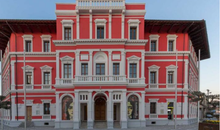

The race for the head of the BKH, the third phase on July 11
2025-07-04 11:20:23

Toxic phrases that show your relationship is in trouble
2025-07-04 11:00:10

2 brothers arrested in Roskovec, cultivating narcotic plants
2025-07-04 10:38:08

Celebrating his 61st birthday today, Rama is surprised at the pink headquarters
2025-07-04 10:21:46
Suspended from duty 4 days ago, Jonaid Myzyri appears before the Criminal Court
2025-07-04 10:16:27
Heat wave/ 5 deaths in Italy from high temperatures
2025-07-04 10:07:55
Economy slows, telecommunications joins agriculture and industry in recession
2025-07-04 09:58:13


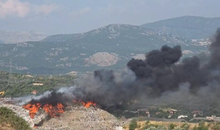
Fire continues at Elbasan incinerator, toxic smoke endangers citizens' health
2025-07-04 09:19:06
The USA celebrates its 249th anniversary of Independence
2025-07-04 09:09:22

After Rama's ultimatum, all directors of the Vlora municipality resign
2025-07-04 08:46:30
Russia, the first country in the world to recognize the Taliban government
2025-07-04 08:37:20
10 facts about the 10th legislature!
2025-07-04 08:21:35
Foreign exchange/ How much foreign currencies are bought and sold today
2025-07-04 08:01:50

Weather forecast for today
2025-07-04 07:36:43
"Don't be afraid", here's what the stars have predicted for each sign
2025-07-04 07:21:48
Morning Post/ In 2 lines: What mattered yesterday in Albania
2025-07-04 07:03:17
Bushati: Zegjineja, a book piloted by Rama
2025-07-03 22:57:30






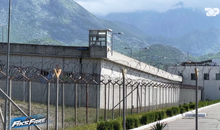

Greece imposes fee to visit Santorini, how many euros tourists must pay
2025-07-03 20:50:37
Don't make fun of the highlanders, Elisa!
2025-07-03 20:43:43
Gunfire in Durres, a 30-year-old man is injured
2025-07-03 20:30:52

The recount in Fier cast doubt on the integrity of the vote
2025-07-03 20:09:03


